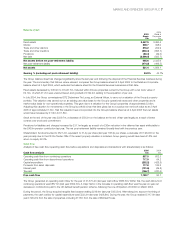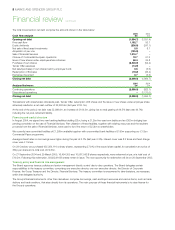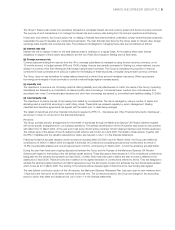Marks and Spencer 2005 Annual Report Download - page 19
Download and view the complete annual report
Please find page 19 of the 2005 Marks and Spencer annual report below. You can navigate through the pages in the report by either clicking on the pages listed below, or by using the keyword search tool below to find specific information within the annual report.
MARKS AND SPENCER GROUP PLC 17
performance related nor pensionable. They do not participate in
any of the Company’s incentive plans or share schemes. The fees
for non-executive directors are reviewed regularly and the last
change was effective from 1 April 2003.
The Chairman’s fee for his initial period in office from 31 May 2004
(when he stepped in at short notice to respond to a possible offer
for the Company) to 5 August 2004 was, at his request, the same
rate of £50,000 per annum as he had received as a non-executive
director. For the period from 5 August 2004 for continuing in the
role of Chairman, the Remuneration Committee was in the process
of considering appropriate market benchmarks for remuneration when
the Chairman signalled that he did not wish his remuneration to
exceed £200,000 per annum. The Committee was content to
agree to this level, which has applied since 10 August 2004 in
the knowledge that it is below the market rate for the role. On
appointment as Deputy Chairman on 1 October 2005, Lord Burns
will receive a fee of £175,000 per annum. His remuneration on
appointment to Chairman from July 2006 will be £400,000 per
annum.
Salaries and benefits
Salaries and benefits for executive directors are reviewed annually
and any change to salary is normally effective from 1 January. The
Remuneration Committee takes into consideration a range of
factors when reviewing salaries such as the Company
performance, level of salaries for large retailers and for other major
FTSE 100 companies, market conditions, the level of increase
awarded to employees throughout the business, and the wish to
recognise the responsibilities of individual directors. Current annual
salaries for executive directors are set out in the Directors’
emoluments table (see page 21).
Stuart Rose and Charles Wilson receive a payment of 20% of total
salary in respect of pension. A payment was also made in respect
of pension in the form of a supplement of 10% of the difference
between the pension earnings cap and their base salary to Roger
Holmes, Mark McKeon and Laurel Powers-Freeling up until their
respective leaving dates. These amounts are included in the
emoluments table as part of benefits.
Laurel Powers-Freeling was provided with accommodation in
Chester to accommodate her working pattern (two days in
London, three days in Chester – the location of M&S Money).
A taxable benefit arose, which was met by the Company. For
executive directors, the provision of a car and fuel is included
in the emoluments table as part of benefits, where relevant.
Annual Bonus Scheme
The Annual Bonus Scheme is designed to reinforce the relationship
between team and corporate performance and reward. The targets
are determined annually by the Committee and for 2004/05
incorporated a mixture of financial measures and personal
business targets. The Committee assesses the achievement of
targets for all executive directors, with advice from the Chairman
and Chief Executive. The 2004/05 bonus for directors starts at
40% of base salary for on-target performance rising to a maximum
of 100% for exceeding targets.
This year, the financial targets have not been met and no award
has been made to any executive director under this element of the
scheme. Two directors received an award for delivery of revised
objectives relating to corporate activities following the possible offer
for the Company in May 2004, as shown in the emoluments table.
No director has been invited to invest any element of their bonus
in the Share Matching Plan for 2005.
The Company is proposing to make changes to the bonus scheme
with effect from the 2005/06 financial year to focus senior
executives on the specific operational improvements which need to
be made over the next year in order to drive the Company’s
recovery. The key measure for executive directors will be Group
profit before tax, with demanding targets that require a significant
recovery in the Company’s Performance.
In particular, the Group profit before tax has been set taking into
account market expectations for 2005/06. 60% of salary is
payable for achieving target performance, and no bonus payable if
this target is not achieved. The target will need to be substantially
exceeded in order for a bonus of 100% of salary to be earned. All
targets will represent marked improvements on the reported profit
of 2004/05. The maximum bonus for an executive director in
2005/06 is 150% of salary.
The executive directors will be required to defer 50% of any bonus
paid into shares which will be held for three years. There will be
no match paid against these deferred shares, although the value
of any dividends earned during the deferral will be paid at the end
of the period. The deferred shares will normally not be receivable
in the event that the executive leaves employment during the
deferral period.
Long-term Incentive Schemes
(a) Executive Share Matching Plan
An Executive Share Matching Plan for senior management was
approved by shareholders at the Annual General Meeting in 2002
and was introduced in July 2002. The Plan operated in 2002,
2003 and 2004 for up to 25 selected senior management. The
Company does not intend to operate this plan for executive
directors in 2005 or future years. Participants were required to
invest one-third of any annual bonus earned in shares of the
Company. Any part of the balance may have been invested
voluntarily.
The pre-tax value of the invested bonus would be matched by an
award of shares, with the extent of the match determined by
performance conditions. The current performance conditions are:
•50% of the invested bonus receives a matching award based
on the Company’s Total Shareholder Return (‘TSR’)1compared
to the constituents of the FTSE 100 at the start of the
performance period; and
•50% of the invested bonus receives a matching award based
on the Company’s TSR compared to a selected comparator
group of UK retailers, which for 2004 is as follows:
Big Food Group William Morrison
Boots Next
Dixons Sainsbury
GUS Somerfield
House of Fraser Tesco
Kingfisher WH Smith
Matalan Woolworths
MFI
























